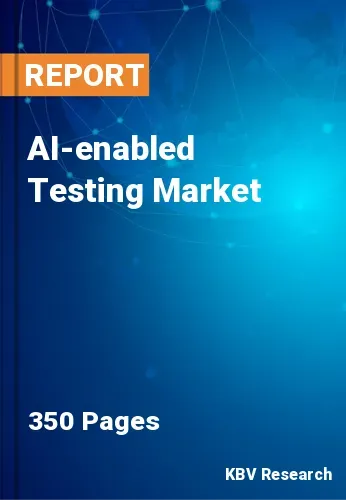The Global AI-enabled Testing Market size is expected to reach $1.4 billion by 2030, rising at a market growth of 17.9% CAGR during the forecast period.
Within the BFSI Industry, it is essential for fraud detection and prevention to detect probable fraud in real-time. The BFSI segment generated $41,820.9 thousand revenue in the year 2022. AI systems also examine massive amounts of customer behavior patterns, transactional data, and prior fraud cases. As a result, financial institutions can better identify and stop fraudulent transactions, reducing losses and protecting consumer funds. Furthermore, AI-enabled testing supports financial organizations in risk assessment and guaranteeing regulatory compliance.
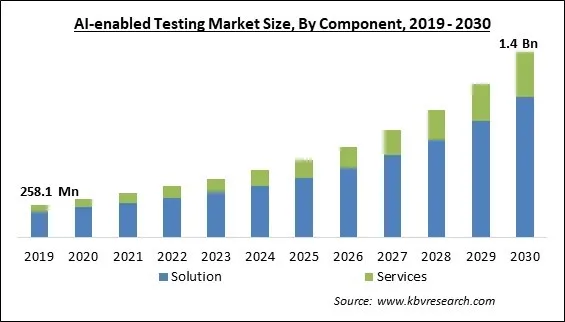
The major strategies followed by the market participants are Partnerships as the key developmental strategy to keep pace with the changing demands of end users. For instance, In June, 2022, Sauce Labs Inc. partnered with Keysight Technologies, to deliver artificial intelligence (AI)-driven automated testing of applications across thousands of devices, browsers, and OS combinations. Additionally, In May, 2021, Micro Focus collaborated with Microsoft Corporation, to reduce government clients' infrastructure costs.
Based on the Analysis presented in the KBV Cardinal matrix; Capgemini SE and IBM Corporation are the forerunners in the Market. Companies such as Sauce Labs Inc., Applitools, Tricentis are some of the key innovators in the Market. In June, 2023, Sauce Labs Inc joined hands with TestRail, to integrate its technology and enable engineering and product teams to boost digital innovation without prohibitively increasing risk.
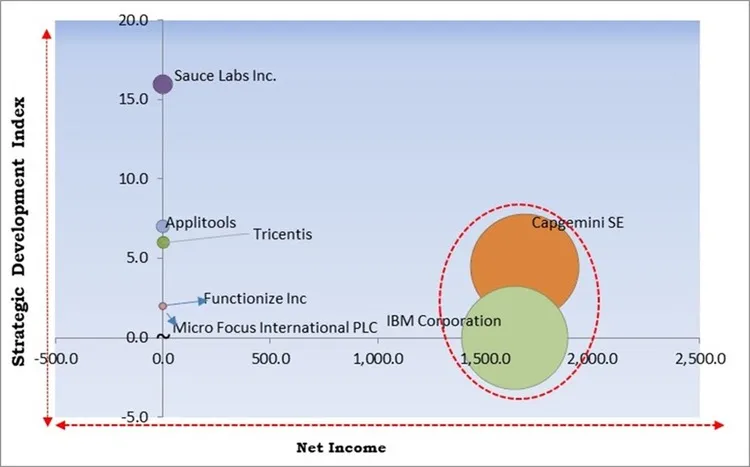
In recent years, the demand for AI-enabled testing tools has increased owing to its numerous benefits. These tools help developers in developing test cases, executing them as per changes, planning, automation of identical workflows, user interface (UI) testing, and testing before releases. Making a test case for a single field requires the AI software to recognize and automate the test cases that must be performed for a single field type. Once the AI program has determined which portions of the code have changed, it may conduct a risk analysis and choose which test cases should be run to ensure nothing is automatically broken before the release. These steps can be performed repeatedly without needing more resources, thus saving time and money for businesses. Since more companies are expected to become aware of the benefits of AI-enabled testing in the coming years, it will significantly propel the market's growth.
A software engineering approach known as "fail-fast" emphasizes the need to spot errors and possible issues as early in developing software as is practical. 'Fail fast, fail often' refers to the capability of rapidly and repeatedly making amends. To do this, systems that can accelerate procedures and enable immediate feedback needs to be implemented. The 'fail fast, fail often' strategy only functions if a business can recover from failures in the shortest amount of time. By automating repetitive operations, decreasing human effort, and cutting the length of testing cycles, AI-enabled testing simplifies the testing process. As a result, businesses can shorten their time to market and acquire a competitive advantage. Hence, this development will fortify the market's expansion.
AI can assist with repetitive jobs roughly identical to earlier completed ones. But even if AI is used to its fullest extent, some activities will still need human labor. Activities like documentation review, test creation for complex scenarios, test result analysis & reporting, and user experience testing need human intervention. Many businesses still consider It best to have a person examine the documentation to fully comprehend a system that requires to be constructed. All AI models employed in testing are subjected to stringent model validation procedures, as well as constant monitoring and improvement. Therefore, these AI drawbacks may hamper the market's growth in the coming years.
Based on component, the market is characterized into solution and services. The solution segment garnered the highest revenue share in the market in 2022. The adoption of commonly utilized AI-based solutions for detecting criminal activity is propelling the growth of the segment. The detection of fraudulent operations is helped by AI-based tools and machine learning algorithms. These technologies are used on a wide variety of customer and operator data to identify features of the general traffic.
On the basis of technology, the market is classified into machine learning & pattern recognition, natural language processing (NLP), and computer vision & image processing. The natural language processing (NLP) segment recorded a significant revenue share in the market in 2022. Fresh technological breakthroughs have led to significant growth in the NLP demand. The need for cloud-based technology is rising, and improvements in communication infrastructure and NLP are speeding up this rise. The link between machines and humans, NLP entails running computer programs and data analysis.
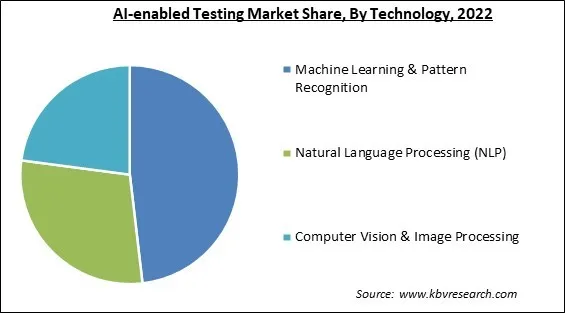
By application, the market is divided into test automation, infrastructure optimization, and others. The test automation segment witnessed the maximum revenue share in the market in 2022. AI-enabled testing solutions significantly improve test automation by utilizing AI algorithms and approaches, driving the segment's growth. It can increase the scalability and flexibility of the testing process when used with cloud computing instances. Organizations can improve the accuracy, efficiency, and productivity of their testing processes by integrating AI-enabled testing with automated tests.
Based on deployment, the market is segmented into on-premises and cloud. The cloud segment acquired a substantial revenue share in the market in 2022. Cloud solutions offer practically limitless scalability and resources, and thus drive the segment's expansion. Depending on demand, businesses easily provide and scale down or up their AI-enabled testing infrastructure. They can meet demanding testing needs on a big scale effectively and economically, owing to their flexibility.
On the basis of end-use, the market is segmented into IT & telecommunication, healthcare, energy & utilities, BFSI, government, and others. The IT and telecommunication segment recorded the largest revenue share in the market in 2022. The need for more effective customer services and operational networks in the telecommunications sector is driving the segment's expansion. Testing requires less manual labor and time owing to AI algorithms that build test cases, run tests, and analyze results on a large scale. Faster time to market for innovative telecom services and features is made possible by increased testing cycle efficiency. In addition, the system examines network traffic patterns, spots irregularities, and picks out potential security risks.
| Report Attribute | Details |
|---|---|
| Market size value in 2022 | USD 402.1 Million |
| Market size forecast in 2030 | USD 1.4 Billion |
| Base Year | 2022 |
| Historical Period | 2019 to 2021 |
| Forecast Period | 2023 to 2030 |
| Revenue Growth Rate | CAGR of 17.9% from 2023 to 2030 |
| Number of Pages | 350 |
| Number of Table | 543 |
| Report coverage | Market Trends, Revenue Estimation and Forecast, Segmentation Analysis, Regional and Country Breakdown, Competitive Landscape, Companies Strategic Developments, Company Profiling |
| Segments covered | Component, Technology, Application, Deployment, End Use, Region |
| Country scope | US, Canada, Mexico, Germany, UK, France, Russia, Spain, Italy, China, Japan, India, South Korea, Singapore, Malaysia, Brazil, Argentina, UAE, Saudi Arabia, South Africa, Nigeria |
| Growth Drivers |
|
| Restraints |
|
Region wise, the market is analyzed across North America, Europe, Asia Pacific, and LAMEA. The North America segment procured the maximum revenue share in the market in 2022. The market in this region is expanding due to the noticeable growth of automation testing. In order to enhance the functioning of the product, mobile applications are increasingly using AI regression testing. In this region, the market is growing due to increased urbanization, shifting lifestyles, increasing disposable income, and cutting-edge technologies. Growing R&D spending, rising demand for automated testing remedies, and introduction of new products all contribute to the market's expansion in the United States.
Free Valuable Insights: Global AI-enabled Testing Market size to reach USD 1.4 Billion by 2030
The market research report covers the analysis of key stakeholders of the market. Key companies profiled in the report include Sauce Labs Inc., Retest (UBS Hainer GmbH), Functionize, Inc, Diffblue Ltd., Applitools (Thoma Bravo), Capgemini SE, TestRigor, Micro Focus International PLC (Open Text Corporation), Tricentis and IBM Corporation
By Component
By Technology
By Application
By Deployment
By End User
By Geography
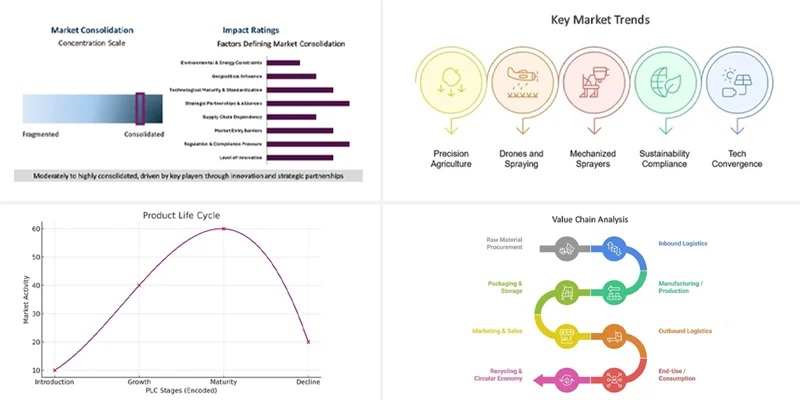

The Market size is projected to reach USD 1.4 billion by 2030.
Emerging concept of ‘fail fast, fail often’ among product developers are driving the Market in coming years, however, Issues of AI model reliability and quality restraints the growth of the Market.
Sauce Labs Inc., Retest (UBS Hainer GmbH), Functionize, Inc, Diffblue Ltd., Applitools (Thoma Bravo), Capgemini SE, TestRigor, Micro Focus International PLC (Open Text Corporation), Tricentis and IBM Corporation
The Machine Learning & Pattern Recognition segment generated the maximum revenue in the Global AI-enabled Testing Market by Technology in 2022; thereby achieving a market value of $669 million by 2030.
The North America region dominated the Market by Region in 2022 and would continue to be a dominant market till 2030; thereby, achieving a market value of $545 million by 2030.
Our team of dedicated experts can provide you with attractive expansion opportunities for your business.
